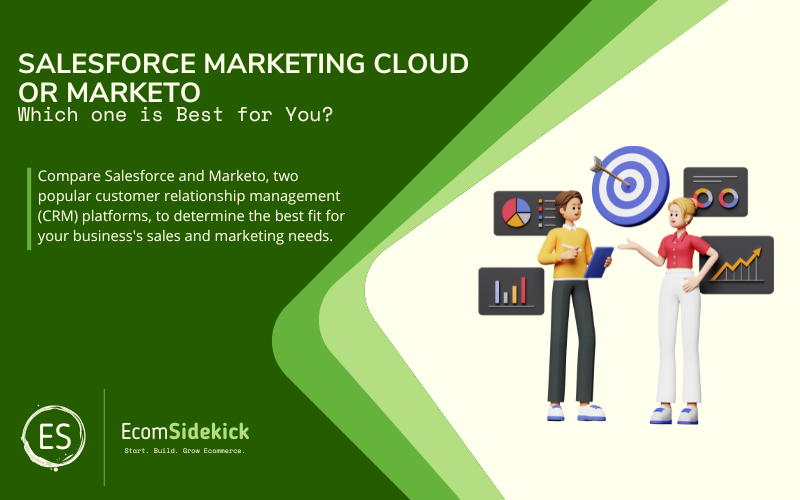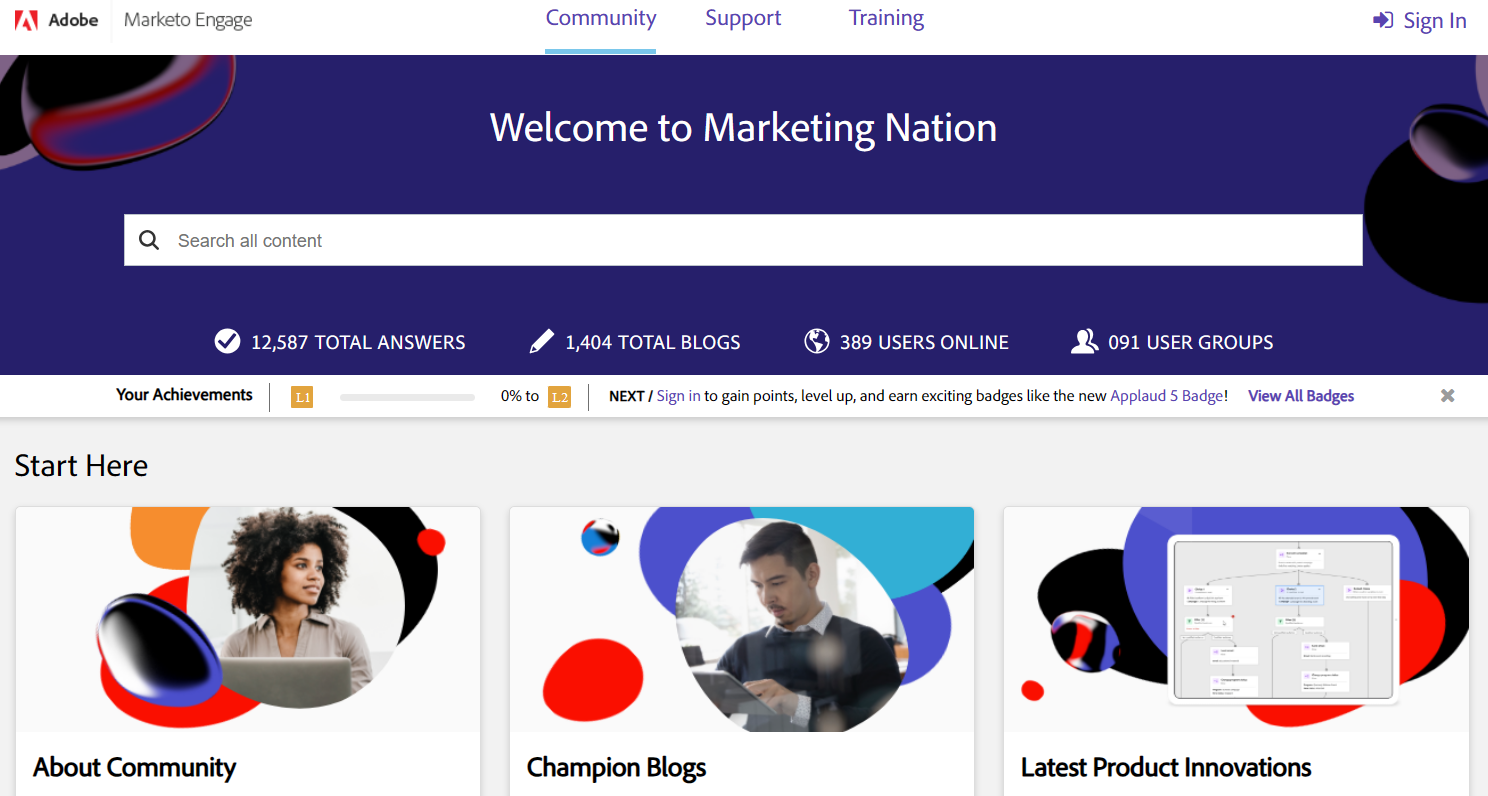For a good number of companies today, their success is tied to a good marketing platform. And making a good decision is crucial for your business.
You will depend on several factors, such as the platform’s ease, the number of tools available, and the prices offered by these platforms.

This article will cover the essential features of two marketing automation platforms: Salesforce Marketing Cloud vs Marketo. We will cover how each of these companies came about, demonstrating their reliability.
The key here is to understand how important these tools are with the massive shift to teams working at home.
We will also specify the features present in each platform, demonstrating differences in this marketing automation industry. And then, you will be able to analyze whether any of them will suit your sales team members and business.
Salesforce Marketing Cloud, An Ally For Your Business
The giant marketing automation platform, Salesforce Marketing Cloud, in 2009, was the first cloud-based company to reach the $1 billion mark in annual revenues. This was and remained a historic milestone.
In 1999, Parker Harris, Dave Moellenhoff, and Frank Dominguez created the company known worldwide as “Salesforce.” Their specialization comprises Software as a service (SaaS).
The company’s success was so gradual that from 2001 through 2003, the company went from $5.4 million to over $100 million by the end of 2003, drawing worldwide attention. And in 2004, it made its public offering on the New York Stock Exchange, raising approximately $100 million that year.

The technological development of Salesforce’s Software has been improved over the years. In September 2022, the company made an application deal for Meta, Whatsapp, aiming to integrate a Salesforce Pardot customer 360 platforms. In this way, companies’ communication with the consumer will be enhanced.
In this sense, we can denote how important Salesforce Marketing Cloud is for the market, demonstrating both in economic growth and in its CRM technology. This way, Salesforce Marketing Cloud offers a wide range of services focused on customer relationship management, such as sales cloud, service cloud, Platform, Marketing Cloud, MuleSoft, Slack, and Trailhead Analytics.
The advantages of using Salesforce Marketing Cloud consist of a vast and complete application store, offering collaboration between users called “chatter.” There is also a total, browser-driven support availability.
Salesforce Marketing Cloud was the pioneer in CRM, basing its system on the cloud, and its provider is the world’s most significant in the CRM market. These are some of the qualities that make Salesforce Marketing Cloud unique in the marketplace.
You and your staff can work on a platform about your customers and prospects. This way, you stay connected to your customers, interacting personally with them.
You can synchronize your sales and marketing system with Salesforce Marketing Cloud Native Integrations, which gives you the best of both worlds. You will be able to generate customer data, do analysis and insights and share your activity.
In addition, you can perform email marketing and email smart campaigns through the SalesForce integrated platform, no matter what your marketing goals are, such as introducing a new product, offering customized products, and even offering exclusive discounts.
This email marketing platform is a great digital marketing strategy. It consists of sending your potential customers, your company’s contact list, and leads a direct communication.
In short, it is a message in email format, which will arrive at your customer’s address at the most opportune and strategic moment, causing them to open and interact with your brand and convert.
Salesforce offers several email templates in its email studio, providing your company with the best possible experience when it comes to email marketing.
Even with so many qualities, it is necessary to mention some disadvantages or not-so-good features of Salesforce. The company’s Software is not a unique and exclusive system.
There are similar services on the market, such as Microsoft Dynamics 365; There is no on-site hosting;;There are certain limits to application downloads, storage, and emails; There are mandatory updates, which will force you to pause the system to update and apply the update package; Salesforce’s values, if compared to its competitors, are high and may have extra costs.
Maketo is known in the market for its marketing software automation, which is nothing more than a SaaS from adobe, focused on professionals who want to improve their marketing performance and strategies.
No matter if you want to run communication campaigns or find more qualified leads, you will be able to perform many custom marketing tasks using this amazing tool.
And you will be able to perform efficient social media management work, making digital marketing automation work very complete. You will be able to monitor and analyze your company’s sales, which is crucial for success.
Therefore, you will be able to improve the user experience, attracting more and more of your potential customers, or even those who are already in your contact base. Marketo proves to be having an ideal Multi-Channel Communication for your company.
Also, one of the drawbacks is that Salesforce is showing its age. The Software still has pricing plans based on monthly subscriptions, but it is also charged annually. If you buy the cheapest option for your company of 20 people, you must calculate your actual monthly and annual spending.
Below we list the pricing plans offered by Salesforce:
Plans | Value per Month |
Starter | $25month |
Professional | $65/month |
Enterprise Plan | $125/month |
Unlimited | $250/month |
Sales and Service Cloud Bundle | $300/month |
What Is Buffer?
Buffer is a clean and user-friendly tool that provides features for publishing content on social media channels. It’s easy to set up and start working with a Buffer account. The primary strength of the tool is its extreme ease-of-use.
Buffer provides many features for data analysis and report creation. It even provides strategic recommendations for increasing social reach and engagement. And it integrates with the latest social features like Instagram Stories.
Some of the most prominent features of Buffer are:
- It has dedicated apps for content publishing and analysis
- Using Buffer, you can visually plan your social media campaigns
- It also provides in-depth insights for measuring social media engagement.
Both Hootsuite and Buffer work with most of the popular social channels, but I’ve found their primary focus to be different. Hootsuite is a dedicated social media management tool and lets you manage all your social channels from a single location.
Buffer focuses more on the content creation side of things. At its heart, it’s a tool for queuing and publishing content that integrates with social sites. Naturally, Hootsuite is a more comprehensive tool and provides more features than Buffer.
In the following sections, I’ll provide a feature comparison of the two tools so that social media marketers can their own decision on which is best.
Marketo: A Market Leader

Marketo is currently a market leader, as the title above suggests. Its Software helps with organization, engagement metrics, marketing automation, marketing workflows, and tasks.
Marketo is Software-as-a-Service (SaaS) based, a system that commands the automation of marketing campaigns, allowing those campaigns to be personalized across multiple digital channels.
But finally, how did Marketo come about? In January 2006, the company was founded, gaining notoriety only six years later, in 2012. That same year, it was ranked as the number-one company in terms of its astonishing growth. However, in 2013 and 2014, its ranking dropped not even getting ranked.
In 2018 Marketo was bought by Adobe for $4.7 billion. From then on, there was integration into the adobe marketing suite, whose headquarters is in San Jose, California.
The new and revamped Adobe Marketo Engage offers its services primarily to companies and professionals in B2B marketing Analytics, enterprise-level, and B2C buyer marketing.
The industries are as diverse as possible, including business services, healthcare, manufacturing, technology, education, financial services, etc. Companies like Charles Schwab, GE Panasonic, and RingCentral are some of their most successful customers.
Just as we did with Salesforce, we will list Marketo’s licensing costs here:
Plans | Value per Month |
Spark | $895,00/month |
Standart | $1.795,00/month |
Select | $3.195,00/month |
The advantages of using Marketing for CRM services are several. Among these advantages is the Software, which works strategically with deep analytics; the customer support runs Monday through Friday from 6 a.m. to 6 p.m.; there is a wide diversity of products in Marketo.
Such as real-time personalization, customer experiences marketing, marketing automation, and management. And lastly, Marketo’s CRM, which enables integration with Microsoft Dynamic and Salesforce, is very innovative.
Some negative points regarding Marketo refer to the possible need for IT specialists due to some complexities of the Software. You may need a member of your marketing team dedicated exclusively to this marketing automation software. One last detail concerns its modular product system, which is complicated. Its pricing plans is considered high.
Dynamic List Of Several Differences In The Market Between Salesforce And Marketo
The first one concerns the following:
Market share by top sites:
- Marketo is leading in top 10k sites, top 100k sites, top 1M sites;
- Although Salesforce has recently grown a lot, it still lags behind Marketo in all market share segments.
Geography:
- Marketo is absolutely the leader in most countries, including the United States, United Kingdom, Japan, Australia, and 147 more different countries;
- Salesforce has no advantage over Marketo in absolutely no country.
Website categories:
- Marketo leads the website categories in several aspects. These categories correspond to technology, electronics, computers, consumer services, business, science, and 20 other available types.
- On the other hand, Salesforce is the leader in e-commerce and shopping.
It is undeniable that marketing automation software with CRM services is indispensable for your company. Let’s look below at a dynamic list of seven advantages you will get by opting for Marketo or Salesforce:
- The data will be more simplified and cleaner. This way, you’ll avoid overlapping or redundant data entry, maintaining significantly greater organization;
- Leads: marketing and sales work must go together. If you integrate Marketo with Salesforce, for example, your work will be much more effective;
- Real-time data intelligence and insights. Both Salesforce and Marketo store essential data from your customer base. That way, your team of marketers can have access to each of them with the real-time sales alert;
- A better picture of your customers can be made in both Software. This method is called Cohesive Behavioral Insights;
- Targeted content can be created per your customers’ accurate database. This enhanced content strategy can be done through Marketo in conjunction with Salesforce;
- You can combine the two Software to enable a more comprehensive and effective reach, projecting your sales and marketing to more accounts;
- You can create automated or digital workflows in both Software. This way, you will get more intelligent workflows, augmented by a tight integration of your activities.
Salesforce Vs Marketo: Final Thoughts
Above, it mentioned the integration of Salesforce and Marketo. This synchronization is known as bidirectional, where information flows bidirectionally.
Salesforce allows bidirectional synchronization of your contacts, leads, and smart campaigns. You can do one-way Salesforce syncs with Marketo for leads, users, traffic sources, opportunities, custom objects, and activity elements in Salesforce software.
And there is a native tool in Salesforce to create an integration with Marketo. However, this tool is less advanced features, which may entail extra technical work. Such as adequately synchronizing your fields, troubleshooting your software instantiation, and sorting your data.
Besides the presence of several unique features of the Software, it is essential to look at the reviews that are available on the internet. Marketo has a G2 Crowd score of 4.1 out of 5 stars and a Trusted Radius score of 4.2 out of 5 stars. And Salesforce has a Trusted Radius score of 4.1 out of 5 stars and a G2 Crowd score of 4.1 out of 5 stars.
Whichever Customer Relationship Management (CRM) Software you choose for your company, look at some crucial details. Such as the ease of use, interface, number of tools available, extra costs, licensing cost, and efficiency of the Software.
Marketo, for example, offers a wide range of tools and an easy understanding of its Software. This way, you can use it without extensive lessons on how to use it.
On the other hand, we have Salesforce, which has a vast immersion in CSS, Scrip, and HTML code, which will help your team marketing department perform your smart campaigns.
However, Salesforce has higher Its pricing plans is considered high than Marketo, and possibly more technical knowledge base will be required to work with Salesforce.
Also note that there is the possibility of an integration between Salesforce and Marketo, which will directly boost your Marketing campaigns and marketing solutions.
Make your choice wisely, especially considering your budget and your team’s technical knowledge base. That way, you will make the right choice for your company.
Frequently Asked Question
What Are Salesforce and Marketo, and How Do They Compare as Marketing Automation Platforms?
Salesforce and Marketo are both popular marketing automation platforms used by businesses to streamline and optimize marketing efforts. Salesforce is a comprehensive customer relationship management (CRM) platform that includes Marketing Cloud, its marketing automation solution. Marketo, on the other hand, is a standalone marketing automation platform. While both platforms offer marketing automation features, Salesforce’s strength lies in its seamless integration of sales, marketing, and customer service functionalities within a unified CRM ecosystem.
Which Platform Offers Better Integration With Other Sales and Customer Service Tools: Salesforce or Marketo?
Salesforce is widely recognized for its strong integration capabilities with various sales and customer service tools. As a CRM platform, Salesforce allows seamless communication between marketing, sales, and customer support teams, enabling a unified view of customer interactions and history. Marketo also offers integration with other systems, but it may not have the same level of native integration as Salesforce does within its CRM ecosystem.
In What Ways Can Salesforce and Marketo Optimize Lead Management and Nurturing?
Both Salesforce and Marketo provide lead management and nurturing capabilities. Salesforce’s Marketing Cloud allows marketers to manage leads, segment audiences, and create personalized campaigns based on CRM data. Marketo specializes in lead management, nurturing, and lead scoring, helping businesses identify and engage with potential customers at various stages of the buyer’s journey.
Which Platform Is Better Suited for Enterprise-Level Organizations: Salesforce or Marketo?
Salesforce is a preferred choice for enterprise-level organizations due to its comprehensive CRM capabilities, scalability, and integration with other Salesforce products, such as Sales Cloud and Service Cloud. It offers a complete suite of tools for managing customer relationships, sales, marketing, and service. Marketo, while also used by larger organizations, may be more commonly adopted by mid-sized businesses looking for a dedicated marketing automation solution.
What Are the Pricing Differences Between Salesforce and Marketo?
The pricing structures of Salesforce and Marketo can vary based on the scale and scope of the organization’s needs. Salesforce’s pricing is typically based on the CRM edition and the specific products or features required. Marketo’s pricing is commonly based on the number of contacts in the database and the level of functionality needed. Both platforms offer pricing plans tailored to different business sizes and marketing automation requirements.
Paul Martinez is the founder of EcomSidekick.com. He is an expert in the areas of finance, real estate, eCommerce, traffic and conversion.
Join him on EcomSidekick.com to learn how to improve your financial life and excel in these areas. Before starting this media site, Paul built from scratch and managed two multi-million dollar companies. One in the real estate sector and one in the eCommerce sector.

